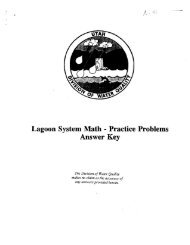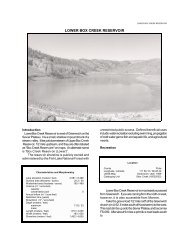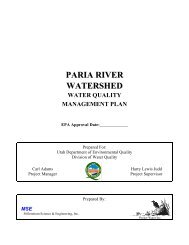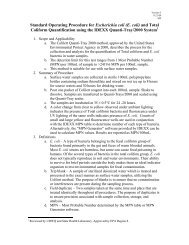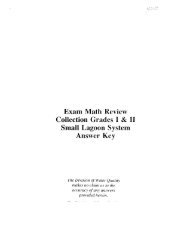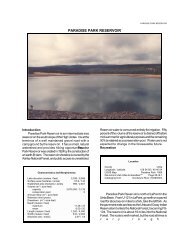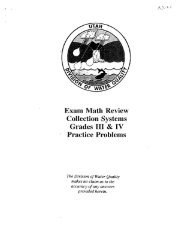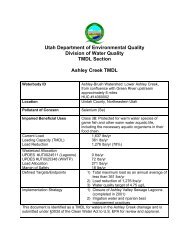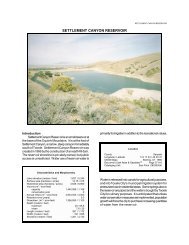ASR from a Legal PerspectiveDenise D. Fort – University of New Mexico School of LawDrought, population growth,groundwater mining, <strong>and</strong> ahost of other challenges areaccelerating the search for new approachesto water supplies. One promising approachalready utilized throughout the UnitedStates is using groundwater aquifers forstorage <strong>and</strong> retrieval of waters. I servedas a participant on the National ResearchCouncil’s panel on managed undergroundstorage (here termed aquifer storage<strong>and</strong> recovery, or ASR) <strong>and</strong> found thetopic to be a rich one for considerationby institutional researchers, because thepractice raises an array of legal questions.The regulatory structure for ASR iscomplicated because the legal arrangementfor managing water historically hasseparated water quality <strong>and</strong> water quantity,as well as groundwater <strong>and</strong> surface water.Several water quality schemes may applyto ASR projects. In certain circumstancesauthority is divided between the federal<strong>and</strong> state governments, <strong>and</strong> states varyin how stringently they regulate theseprojects. The water quality questions maypale in comparison to the water quantityissues. Water allocation is primarily amatter of state control, but states varyin how they view the right to store <strong>and</strong>withdraw water. Ownership <strong>and</strong> control ofaquifer storage raise yet other legal issues.Water QualityThe regulatory system for protectionof water quality depends on how ASRprojects are undertaken. In general,protection of the groundwater aquifer isregulated by states, <strong>and</strong> therefore st<strong>and</strong>ardsvary. Protection of wellheads of drinkingwater systems is a matter of federal law,administered by the states. States may infact provide a higher degree of protectionfor aquifers than required by federal law.The greatest sources of regulatoryconflict seem to be over the degreeof protection required for aquifers. Ifa state prohibits any degradation ofan aquifer, this puts a costly burdenon an ASR project developer. From apragmatic perspective, the question iswhether it is preferable to require a highdegree of treatment before injection/infiltration, or after water is withdrawn.Have most states sufficiently weighedthe water resource <strong>and</strong> pollution risks<strong>and</strong> benefits of ASR projects againstthe long-term protection of aquifers?Probably not, since such projects still arerelatively novel. In fact, nondegradation ofaquifers may be a st<strong>and</strong>ard that preventsprojects from going forward that offergreater benefits than risks, <strong>and</strong> causescostlier treatment than is necessary.Federal involvement in ASR projects isrelatively limited. Insofar as projects areconducted through injection wells, federalUIC (Underground Injection Control)regulations apply, either through theU.S. Environmental Protection Agencyor state-delegated programs. <strong>Recharge</strong>through infiltration is not regulatedby the EPA, although permits may berequired for the discharge to surface water(National Pollutant Discharge EliminationSystem permit) <strong>and</strong> for alterations tostreambeds (Section 404 of the CleanWater Act). The distinction appears to bean accidental consequence of the federalregulatory structure, <strong>and</strong> not a statementabout which type of project presentsgreater risks to aquifers. The federalUIC program is a narrow groundwaterprotection program directed at a particularsource of groundwater pollution, theinjection of wastes into groundwater.Another policy question is whetherthe federal government should bemore involved in regulation of theseprojects, or less. The current federalrole seems to be as a backstop forinadequate state regulation, but onlyfor certain types of projects.In general, one could argue for anexp<strong>and</strong>ed federal role in groundwater<strong>Aquifer</strong> testing of the City of Phoenix’s newest ASR well.22 • May/June 2008 • <strong>Southwest</strong> <strong>Hydrology</strong>
Photo: Gary Ginprotection because so many sources ofgroundwater pollution are inadequatelyregulated by either federal or stategovernments. Pollution from mining,energy production, <strong>and</strong> agriculture, forexample, can be politically difficult forstates to regulate when they are competingto attract such industries. States do notcompete for ASR projects, however, <strong>and</strong>I am aware of no evidence that the statesare failing to adequately regulate them.Furthermore, groundwater pollutionrisks posed by ASR projects appearminimal compared to many other projects,thus they would seem to offer a goodopportunity to allow states to functionas the “laboratories of democracy.”Water QuantityState control over the use of water iswell-established. Federal issues doarise, as for example, when federalfunds are used for an ASR project, orwhere federally owned water rights areproposed as the source water. However,each state’s water regime varies, <strong>and</strong>some states do not clearly address thewater rights issues raised by projects.ASR projects must own or have a rightto control the water that is used forrecharge. Effluent, one possible sourcewater, is not necessarily owned by theentity that wishes to recharge the aquifer.Critical questions about control of theaquifer are whether the project can useaquifer space for storage <strong>and</strong> whether therecharger has control of the water that ithas put into the aquifer. Generally, a stategovernment would expect to be able touse an aquifer for storage without a clearlegal basis to do so, but the use of aquiferstorage space becomes a thorny legalproblem when there are multiple entitiespumping groundwater in the aquifer. Thelegal questions would be most pointedif a commercial entity proposed such anoperation in an aquifer. In any event, theright to use the capacity of an aquiferfor storage will have to be resolved bystatute or under the common law.Another set of legal concerns arisesfrom how to protect the investmentin the water that has been rechargedwithout harming other entities that maybe extracting water from the aquifer.Where multiple entities utilize an aquifer,The greatest conflictsseem to be overthe degree of waterquality protectionrequired for aquifers.explicit legal guidance or contractsamong the groundwater users would benecessary. Finally, there are potentialliability concerns should a project causeimpairment of another’s water rights.This list of legal concerns mightseem daunting <strong>and</strong> a testiment to thedesirability of statutory <strong>and</strong> regulatoryschemes that respond to the particularissues raised by ASR projects. Despitethe complicated nature of these projects,the NRC report contains discussions ofhow institutional challenges have beenovercome in different jurisdictions.Future Looks FavorableWater projects always are complicated,requiring knowledge of both written <strong>and</strong>unwritten rules <strong>and</strong> the capacity to easethe way through innumerable barriers.ASR projects are viewed as extraordinarilycomplex by some, but the successfulimplementation of these projects suggeststhat these barriers can be overcome. Thereare no comprehensive studies of howmany technically worthwhile projectsfailed due to institutional barriers.A number of factors favor the future ofASR projects. Organized opposition tothem by citizen organizations seems to belacking, except when treated wastewateris proposed for drinking water reuse.Among the choices for water storage,ASR appears to be one of the most benign,since storage underground does not affectriver function <strong>and</strong> it decreases evaporationlosses. ASR may even provide ancillaryenvironmental benefits. Environmentalrisks exist, but perhaps have been betteraddressed than many others associatedwith water, such as unregulatedpesticide runoff, the effects of oil <strong>and</strong>gas operations, <strong>and</strong> even leaking septicsystems. A well-thought-out regulatorysystem, providing appropriate informationabout risk, opportunities for publicparticipation, <strong>and</strong> appropriate regulationshould allow this technology to be utilized.State governments should consideradopting regulatory regimes thatspecifically address the issues raisedby ASR. Doing so lessens transactioncosts <strong>and</strong> provides a more tailoredreview of issues that arise with respectto these projects. I suggest that it isappropriate for the federal governmentto assist by providing researchfunding <strong>and</strong> for state governments tocooperate in devising templates forregulation, within the constraints ofeach state’s unique water code.Contact Denise Fort at fortde@law.unm.edu. Reador purchase “Prospects for Managed Underground<strong>Storage</strong> of Recoverable Water” (National AcademiesPress, 2008) at books.nap.edu/openbook.php?record_id=12057&page=R1.May/June 2008 • <strong>Southwest</strong> <strong>Hydrology</strong> • 23



